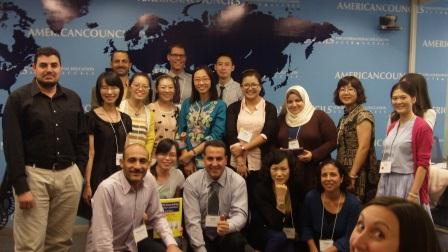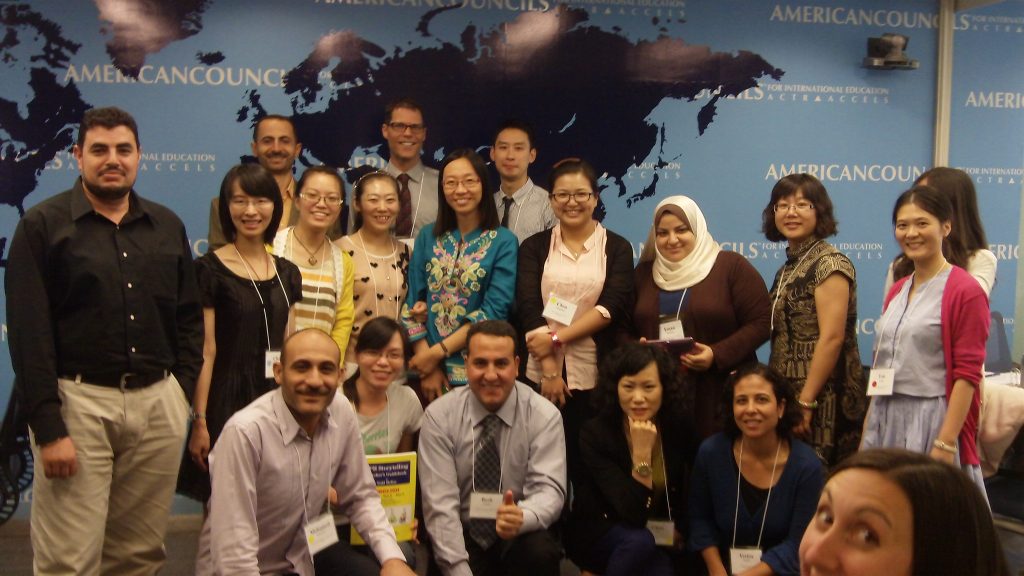An Egyptian Teaching Arabic in America

TCLP gives Egyptian and Chinese teachers the chance to have an authentic experience to come to the United States and teach Arabic or Mandarin. I teach Modern Standard Arabic and act as a cultural resource for the school and the community around Thornton and Denver.
From my perspective, it is a challenge to come from the other side of the world and work as a teacher in a school that has a different system from what I am used to, to learn to adapt to a new culture, and then also to be able to manage classes of students with all different backgrounds.
The school policies, expectations, and understanding of the role of teachers and administrators in each middle and high school took time and effort to completely understand.
There are many exchange programs that help people to visit the United States but this one is more intensive than most because I work in a school, and have my own classes of students that I am completely responsible for. I am also expected to be involved in the school community and figure out how to live on my own.
To prepare, we had a 10-day orientation in Washington DC, but then we went to our host communities to start teaching!
Being in a classroom full of students with different perspectives and cultural backgrounds was a real challenge for me, especially at first. I can’t forget the body language issue which is completely different and confusing between the two cultures. I spent the first month misunderstood when I call my students to come out to the board. That meant they had to come out to the front and stand in front of the class so that everyone can see who they are. Hand gestures can be an issue.
Nevertheless, I am an experienced teacher who has developed a unique set of skills and talents over the years that are applicable anywhere in the world. So, I think it is important that teachers continually figure out the best way to build on what students know, step by step, and engage them in the process of their own learning. I also work hard to make sure my classes are successful.
Today I enjoy comparing different cultures and ways of dealing with problems. I enjoy having the opportunity to compare and then find the most convenient solution.
For example–the bus system is scheduled here in the U.S. It is not like the one in Egypt which usually runs every day without a schedule. So I have to keep the schedule in my bag and estimate the time, the day, and the nearest bus stop and I think it works well now.
One cultural difference that I have learned is that Americans like to plan in advance. I like the idea of planning for the future in advance. I think it helps a lot in organizing my work.
The weather is also completely different from what I am accustomed to. In summer–it is hot and sunny–in winter it is cold, but you enjoy the sun all day. What I mean is that—it is bearable — unlike in Colorado. I still remember the heavy rain last September and the snowstorm last December. I quickly learned the expression “Stay Warm”, which I found is appropriate to say when you leave someone. With all the cold weather, I understand why the phrase is so common!
This exchange program gives me an opportunity to expose students in my classes to the Arabic language and culture. I try to shed light on my religion, culture, the history of Egyptian civilizations, and current country events in the classroom.
I choose the topics that bring cultural elements to the discussion such as clothes, food, and weather so that students are not only learning the language but gaining a deeper understanding of Egypt and Egyptian culture.
As a cultural resource for the school and the community around, I get to share with other teachers and classes. I have shared with the teacher of Social Studies and helped facilitate some cultural elements of Egypt. I have co-taught with the language Art teacher a novel written by Egyptian Noble Prize winner, Naguaib Mahfouz.
I feel fortunate to be a real model for my culture and to help students get closer to what they study. I like visiting cultural centers to share in different cultural activities and to get the chance to talk and share about Egyptian customs and traditions.
I believe the TCLP is building a bridge between the East and the West–because it gives us a chance to understand each other.
What I gain from this program is not only in teaching or in the educational system, but the chance to live in a U.S. community. I have learned from U.S. culture and enjoy being an ambassador for my country.
Editor’s Note: Mohamed Mehanny is an exchange teacher from Egypt. He teaches Arabic Language and Egyptian culture at Thornton High School and the International School at Thornton Middle in Colorado.

